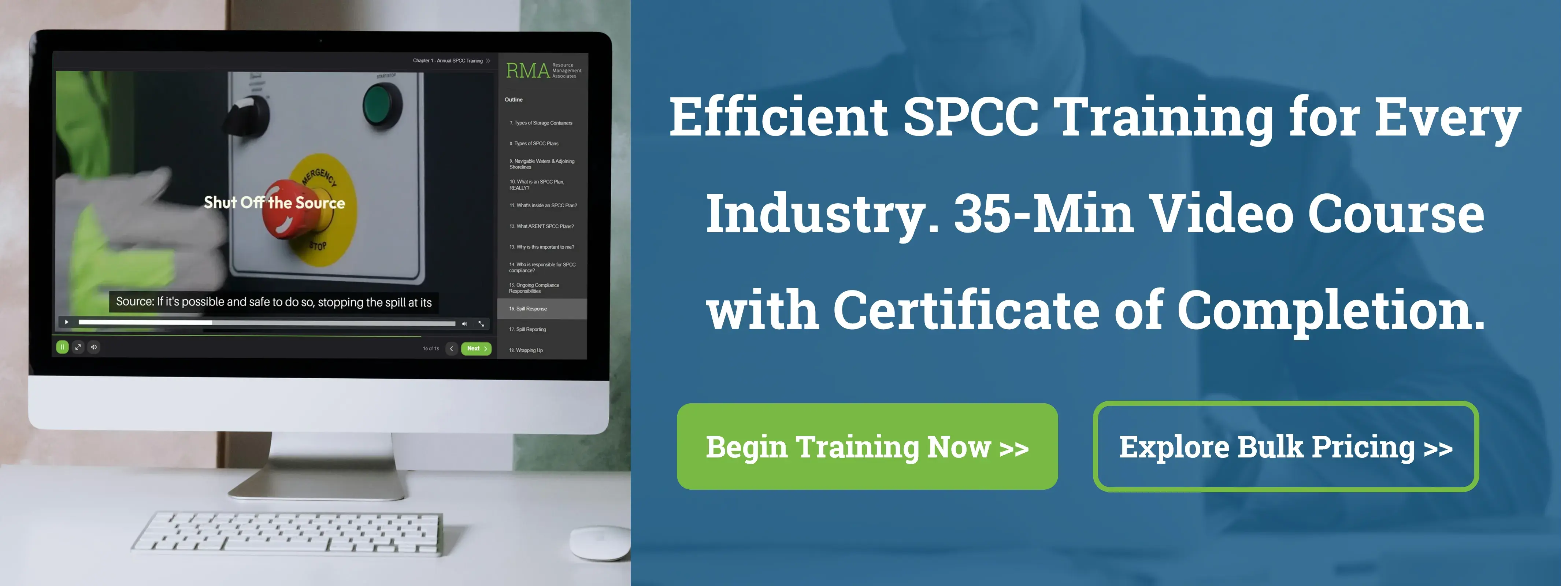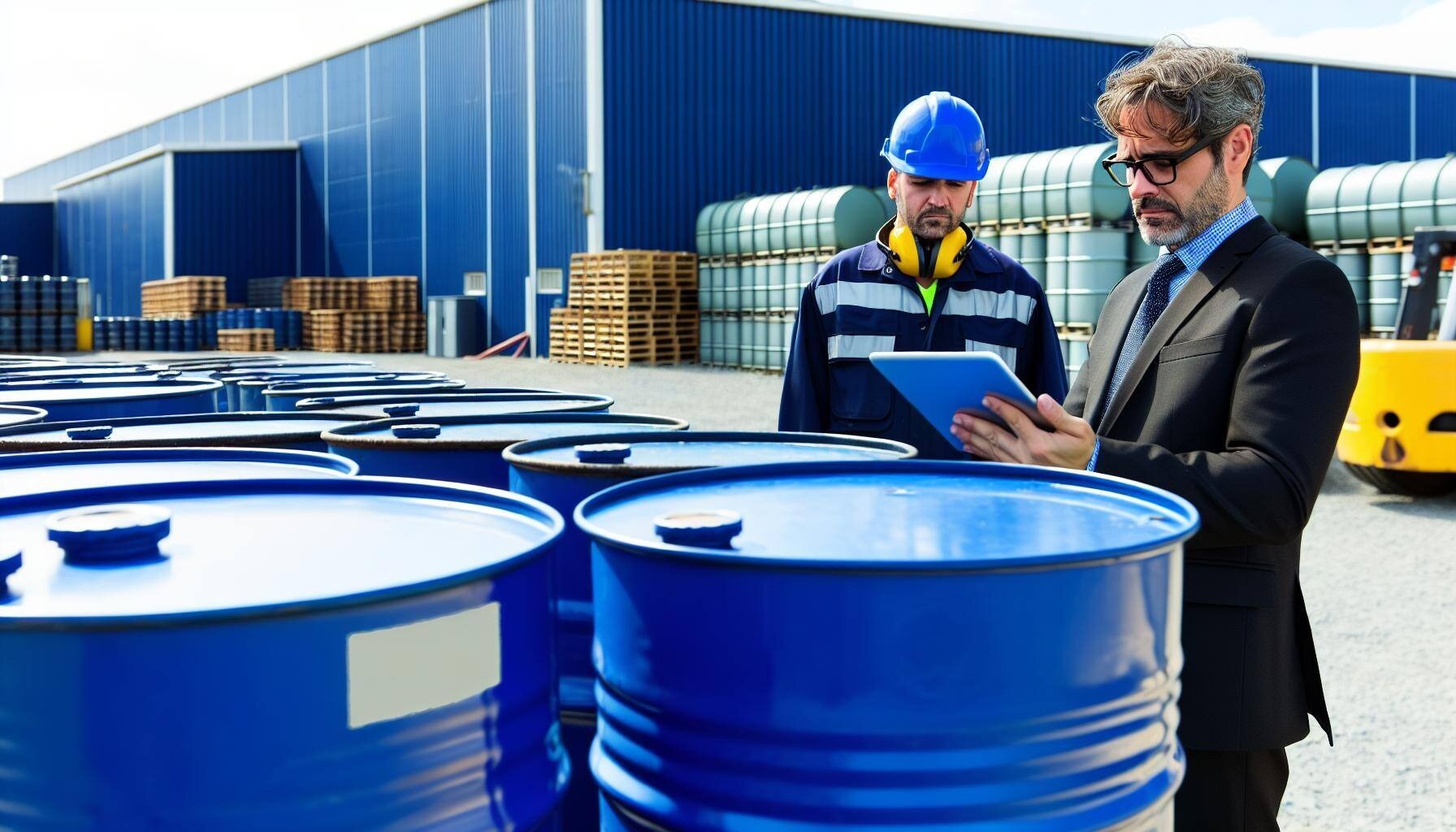Understanding SPCC (Spill Prevention, Control, and Countermeasure) regulations can seem overwhelming, especially if you’re new to the topic or if your role doesn’t involve handling oils and petroleum products directly.
But don’t worry—this quick guide is here to help you grasp the basics of SPCC regulations and why they’re important for everyone in the workplace.
What Are SPCC Regulations?
Here's the quick version: SPCC regulations are federal rules set by the Environmental Protection Agency (EPA) aimed at preventing oil spills from reaching water bodies. These rules require facilities that store oils in excess of specific thresholds to have a plan in place to prevent, control, and counteract spills.
This plan is typically in the form of a physical document - like a book or a binder. Each one is crafted for a specific facility, meaning if you have an SPCC plan, it's your tailor-made resource for all things oil!
Key Components of an SPCC Plan
SPCC plans are often fairly long and detailed, but they really exist and are designed to address three main components:
- Prevention Measures: These include regular inspections, maintenance of oil storage containers, and secondary containment systems to prevent spills from occurring.
- Control Measures: These are strategies to contain spills if they do happen, such as spill kits and absorbent materials.
- Countermeasure Strategies: These involve procedures for cleaning up spills and minimizing environmental damage.
So, while SPCC plans might seem like a hefty read, they're actually pretty straightforward, and are all about covering our bases when it comes to oil mishaps. From regular check-ups to spill cleanup strategies, these plans are our go-to for keeping our workplace safe and our environment happy!

What Do I Need To Do With My SPCC Plan?
Well, if there's a spill, you need to follow your SPCC plan exactly—this includes containing the spill, making notifications, reporting the spill to authorities and clean-up contractors, and conducting a thorough cleanup.
However, there are still some critical tasks you'll need to do even if you don't have a spill!
Ongoing SPCC Compliance Responsiblities
Let's take a look at five of these regular ongoing responsibilities:
- Monthly Inspections: Conduct monthly inspections to identify and address any leaks, spills, or equipment integrity issues in your oil storage and handling systems.
- Updates to the Plan as Needed: Update your SPCC plan whenever there are changes in equipment, operations, or regulations that could impact spill prevention and response.
- Annual Review: Perform an annual review to assess the overall effectiveness of your SPCC plan and make necessary adjustments to procedures and training programs.
- 5-Year Review: Conduct a thorough review of your SPCC plan every five years, including a detailed assessment of structural integrity and re-certification if required.
- Annual Training: Provide annual SPCC training to ensure all staff are knowledgeable about SPCC regulations, spill prevention techniques, and emergency response procedures.

Why Should General Staff Care About SPCC Regulations?
You might be thinking, "I don’t handle oil—why should I care about SPCC regulations?" The truth is, spills can happen anywhere, and it’s important for everyone to be aware of the risks and know how to respond. Here’s why it matters:
- Environmental Protection: Spills pose a threat to the environment, impacting local waterways and wildlife. Familiarizing yourself with SPCC regulations enables you to contribute to safeguarding these precious resources, a cause we can all support.
- Compliance: Helping your facility stay compliant with SPCC regulations can prevent costly fines and legal issues.
- Operational Stability: Dealing with spills requires significant time and resources, potentially disrupting business operations for extended periods, ranging from hours to months.
- Public Image: Maintaining compliance with environmental regulations enhances your organization's reputation and demonstrates a commitment to responsible practices, which can positively influence public perception.
- Safety: Maintaining compliance with environmental regulations enhances your organization's reputation and demonstrates a commitment to responsible practices, which can positively influence public perception.
The big question - how do you ensure your staff understands these regulations, and why they are important? The best way is through comprehensive training. Our engaging and flexible course will equip everyone in your organization with the knowledge and skills needed to maintain compliance, safeguard operational stability, and enhance your company's reputation.
Let's take a minute to explore why SPCC training is essential for everyone.

The Importance of SPCC Training for All
So, why is SPCC training important? To start - it's a requirement! Much like paying your taxes, SPCC training is a mandatory component for staff members who are involved with oil in any capacity - it's the law!
It's not just about ticking off a box; it's about instilling a culture of preparedness and responsibility among all personnel. For this reason, it's becoming more common for businesses to train ALL employees on SPCC regulations - not just those who are involved with oil. After all, SPCC training equips employees with the knowledge and skills to navigate the complexities of effectcive oil management, spill prevention, and emergency response - important knowledge for all staff.
Real-World Impact: Consider This Scenario!
As Sarah, the receptionist at an auto maintenance shop, passes through the garage to take her lunch break, she spots a pool of oil forming beneath a storage container. Immediately, she springs into action. With a quick glance around, she spots the SPCC plan neatly tucked away in its designated spot. Without hesitation, she grabs it and flips through to the emergency contact section.
While Sarah starts making notifications to management and the cleanup contractor, Jack, one of the mechanics, rushes over to assist. Together, they quickly assess the situation, drawing upon their SPCC training to contain the spill using the materials readily available to stop the spill from entering a nearby storm drain.
Meanwhile, Will, a visting regional manager, catches wind of the commotion and hurries over to lend a hand. Seeing Sarah and Jack's swift response, he nods in approval and takes charge of coordinating further actions. With Sarah managing the notifications and Jack assisting with containment efforts, Will ensures that every step aligns with the protocols outlined in the SPCC plan.
By day's end, the spill has been swiftly contained, thoroughly cleaned up, and promptly reported to the necessary authorities. What could have potentially derailed operations for a small business turned out to be nothing more than a minor hiccup, all thanks to the effective implementation of SPCC training.

This scenario illustrates how SPCC training transcends job titles, empowering individuals from diverse roles to collaborate effectively in emergency situations. While the mechanic Jack may be the only employee who was required to have SPCC training, the company's decision to train Sarah and Will underscores the invaluable benefits of extending training beyond designated roles.
Why Our SPCC Training Stands Out
Our Annual SPCC Training Course is designed to make complex concepts easy to understand and apply. Here’s what you can expect:
- Clear Explanations: We break down complex regulations into simple, easy-to-understand language.
- Captivating Presentation: Our sleek narrated videos deliver all the essential information you need in an engaging and visually appealing format.
- Concise and Effective: Focuses on essential information without overwhelming you.
- Applicable to All Industries: Relevant to all staff in any sector, regardless of how much oil you store or what kind it is.
- Flexible and Convenient: Complete the training at your own pace, fitting it into your schedule.
Our quick course is tailored to be accessible and relevant for all general staff across various industries, ensuring that everyone can benefit from it.
Tackle SPCC Regulations with Confidence
Navigating the complexities of environmental regulations is essential for any facility striving for smooth and efficient operations. With RMA by your side, you can ensure compliance while enhancing effectiveness, saving both time and resources.
At RMA, our commitment to supporting you is unwavering. Whether you're embarking on a new project or optimizing an existing one, our expert team is here to help you achieve your environmental compliance goals and streamline your business operations.
Ready to take the next step? Drop us an email at info@rmagreen.com, reach out through our contact page, or call us at 888-RMA-0230. Let's work together to overcome your environmental challenges and keep your business running smoothly.
Additional SPCC Articles





